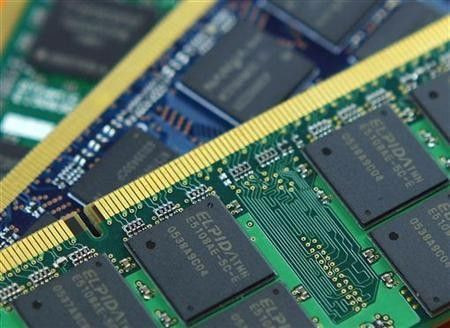Elpida Files for Bankruptcy Protection

(REUTERS) -- Japan's Elpida Memory Inc said it filed for protection from creditors on Monday with 448 billion yen ($5.55 billion) in debt, the biggest bankruptcy filing by a Japanese manufacturer.
The filing suggested that a possible rescue by domestic lenders and would-be overseas equity partners had stalled, the Nikkei newspaper said.
Japan's sole maker of dynamic random-access memory (DRAM) chips has been hobbled by weak prices after a surge in demand for Apple Inc's iPad, which is much less reliant on DRAM chips than conventional PCs.
It was also saddled with heavy capital spending to keep pace with well-funded South Korean rivals Samsung Electronics Co and Hynix Semiconductor Inc, while a strong yen hurt its global competitiveness.
The filing raised concerns that the curtain could be lowered on Japan in the PC memory chip business that it once dominated.
However, speaking in a briefing, Japanese Trade Minister Yukio Edano said he hoped domestic DRAM production could be continued.
Elpida President Yukio Sakamoto will brief media on the bankruptcy filing at 6:45 p.m. (0945 GMT), a company executive said, speaking on condition of anonymity.
The bankruptcy protection will not mean that Elpida will stop producing chips immediately, but Elpida is shrinking and major customers will defect from the company and move to South Korean companies, which means more market share for the latter, said Lee Seung-woo, an analyst at Shinyoung Securities in Seoul.
This is not a bad picture for South Korean chipmakers.
Elpida's debt was the largest ever for a Japanese manufacturer seeking bankruptcy protection, corporate credit research firm Shoko Research said.
The company, formed more than a decade ago by the merger of several large Japanese chipmakers' struggling DRAM operations, is scrambling to meet deadlines in the next two months to repay 92 billion yen in bonds and loans.
Lenders to Elpida, which is a supplier to Apple as well as a victim of the iPad's success, had given the company until this month to devise a turnaround plan, extending an earlier deadline, sources familiar with the situation told Reuters earlier this month.
The company had said it expected to reach an agreement with the relevant parties on the plan. But two weeks ago it said it had been unable to reach a final agreement and it doubted its ability to continue as a going concern.
DRAM DOOM AND GLOOM
Elpida ranked third in the global DRAM market in the July-September quarter, with a 12 percent share, trailing Samsung's 45 percent share and Hynix's 22 percent, data from market research firm iSuppli shows.
Speculation had mounted that Elpida was seeking a deal with U.S. DRAM chip maker Micron Technology and its Taiwanese partner Nanya Technology, although Sakamoto had played down the need for an immediate equity tie-up.
The sudden death of Micron CEO Steve Appleton in a plane crashed this month raised uncertainty about a possible deal.
The Nikkei business daily had also reported this month that the Japanese government was considering a grand plan to consolidate struggling bits of the country's chipmaking sector under a government-supported national champion, bringing in California-based GlobalFoundries to run Japanese plants in a deal that could also include Elpida.
Shares in Elpida, one of the most heavily shorted stocks in Tokyo, have been buffeted over the past several months by rumors and media reports of tie-up talks and collapsed deals.
They slumped to a record low of 294 yen two weeks ago, after the company warned it might not be able to continue as a going concern, only to rally again as high as 368 yen late last week, a gain of more than a quarter.
It (Elpida) may use a bankruptcy filing to seek protection and get more time to solve its debt problem, said Joyce Yang, chief executive of Eureka International Corp, a Taipei-based semiconductor industry research company.
But in the long run it still has competitiveness issues because its yield rate is not good and the chance of seeing a big rise in DRAM prices in Q2 is low.
If Elpida is really exiting the market, one company down is positive news for the overall industry because it will alleviate the oversupply.
($1=80.6850 yen)
(Additional reporting by Yoko Kubota in Tokyo, Hyun Joo Jin in Seoul and Clare Jim in Taipei:; Writing by Edmund Klamann:; Editing by Neil Fullick)
© Copyright Thomson Reuters 2024. All rights reserved.





















